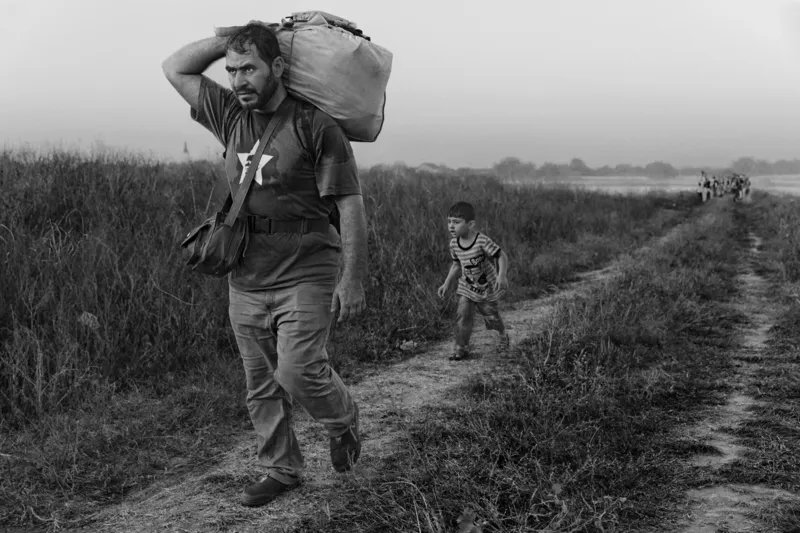James Nachtwey
James Nachtwey is a renowned documentary photographer, known for his poignant and powerful images that capture the human condition amidst conflict, war, and social issues. His work has been featured in numerous publications worldwide, and he has received countless awards for his dedication to documenting the harsh realities faced by people across the globe.
Early Life and Career
Born in 1948 in Syracuse, New York, James Nachtwey grew up in Massachusetts. He studied art history and political science at Dartmouth College, graduating in 1970. His interest in photography began during the Vietnam War era, where he was deeply moved by the images he saw in the media. Nachtwey decided to pursue a career in photography and started working as a newspaper photographer in New Mexico in the late 1970s.
In 1980, Nachtwey moved to New York City and became a freelance photographer, primarily focusing on international news. His first overseas assignment took him to Northern Ireland in 1981, where he documented the sectarian violence. Nachtwey's career as a war photographer took off, and he went on to cover conflicts and social issues in places such as El Salvador, Nicaragua, South Africa, the Middle East, the former Yugoslavia, Rwanda, and many more.
Photographic Style and Techniques
James Nachtwey's photographic style is characterized by its stark, unflinching portrayal of the human condition in times of conflict and despair. He captures the raw emotions and struggles of his subjects, drawing the viewer in and compelling them to bear witness to the suffering of others. Nachtwey's compositions are often striking and carefully considered, making his images both aesthetically powerful and emotionally resonant.
In his work, Nachtwey strives to maintain a balance between empathy and objectivity. He believes in the power of photography to inform and inspire action, and his images serve as a testimony to the resilience of the human spirit in the face of adversity.
Career Highlights
Throughout his illustrious career, James Nachtwey has received numerous accolades, including the prestigious World Press Photo award multiple times and the Robert Capa Gold Medal. He has also been honored with the 2001 Prince of Asturias Award for Communication and Humanities, the 2003 Dan David Prize, and the 2007 TED Prize.
Nachtwey has been a contract photographer with Time Magazine since 1984 and a member of the internationally acclaimed cooperative Magnum Photos. In 2001, he co-founded the photo agency VII, dedicated to documenting conflict and raising awareness about social issues.
Photography Gear
James Nachtwey has used various photography gear throughout his career, including:
Nikon F3 and F4 film cameras
Nikon D3 and D4 digital cameras
Lenses ranging from wide-angle to telephoto, such as the Nikon 17-35mm f/2.8, Nikon 50mm f/1.4, and Nikon 80-200mm f/2.8
Portable strobe lighting for certain assignments
Photography Books
"Inferno" is a gripping collection of Nachtwey's most poignant images from various war zones and crises around the world. These haunting photographs showcase his talent for capturing the raw emotions of individuals caught in the midst of conflict, providing a deeper understanding of the human experience during times of suffering and resilience.
"James Nachtwey Pietas" is a captivating exploration of Nachtwey's work, focusing on the themes of compassion, empathy, and humanity. This book delves into the photographer's commitment to portraying the dignity and vulnerability of his subjects, revealing the power of photography to evoke empathy and raise awareness of global issues.
"Memoria. Guida alla mostra" serves as a guide to an exhibition featuring Nachtwey's work, providing an overview of his career and the various conflicts he has documented. This book offers insights into the photographer's approach to storytelling through images and highlights his dedication to bearing witness to history.
Quotes
"I have been a witness, and these pictures are my testimony. The events I have recorded should not be forgotten and must not be repeated."
"I want my work to become part of our visual history, to enter our collectivememory and our historical conscience. I hope it will serve to remind us that history's deepest tragedies concern not the great protagonists who set events in motion but the countless ordinary people who are caught up in those events and torn apart by their remorseless fury." 3. "I don't think one can avoid a certain degree of subjectivity in any aspect of photography, but I believe it's important to be as truthful and objective as possible, to be a reliable witness."
"I try to be a poet with a camera, using an economy of means to express the maximum amount of information and emotion. I want my images to be as clear and powerful as possible."
"The worst thing is to feel that as a photographer I am benefiting from someone else's tragedy. This idea haunts me. It's something I have to reckon with every day because I know that if I ever allow genuine compassion to be overtaken by personal ambition, I will have sold my soul."
Legacy and Influence
James Nachtwey's work has had a profound impact on the field of documentary photography, raising awareness about critical social issues and contributing to the visual history of our time. His uncompromising approach to capturing the human condition in times of conflict and struggle has inspired many photographers to follow in his footsteps and pursue careers in photojournalism and documentary photography.
Some notable documentary photographers who have been influenced by or worked in a similar vein as James Nachtwey include Sebastio Salgado, Don McCullin, and Steve McCurry. These photographers, like Nachtwey, have dedicated their lives to documenting the human experience in all its complexity and have brought attention to issues that might otherwise go unnoticed.
In conclusion, James Nachtwey's work serves as a testament to the power of photography as a tool for raising awareness, promoting empathy, and inspiring action. His dedication to documenting the most pressing social issues of our time has left an indelible mark on the field of documentary photography and has influenced generations of photographers who strive to use their cameras as instruments of change.












